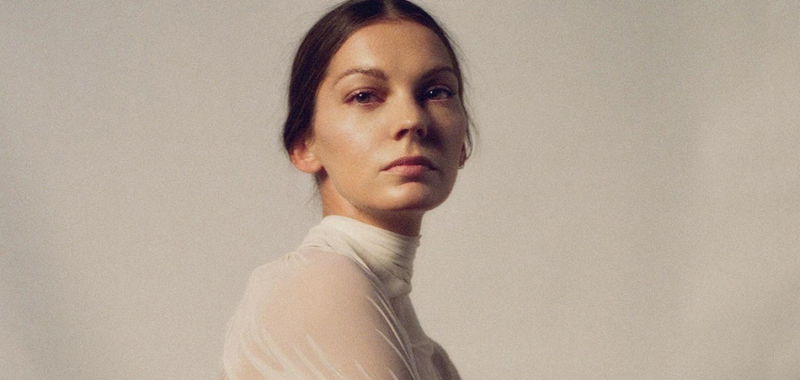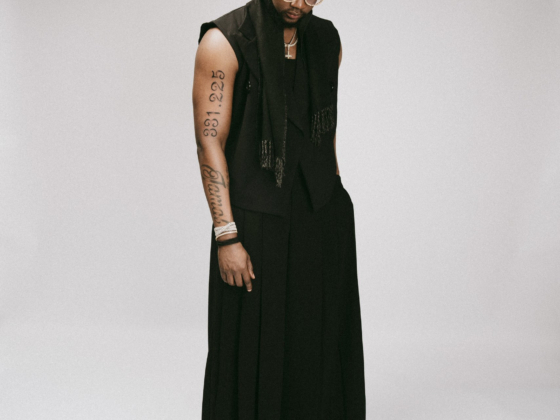In times of adversity, an old idiom states that we should ‘look out for number one.’ While the adage proves useful in many situations, it doesn’t always account for our endlessly romantic nature. Rosie Lowe’s 2016 debut album Control was an introspective project that found the British artist grappling with her artistic identity in the public eye. On her new release YU she turns things outward, examining her relationships with otherness. The LP, which can be pronounced “You” or “Why you,” exhibits multifaceted depth at every turn. Lowe’s exploration of relationships extends not only to romantic partners in her lyrics but also to the blossoming musical team behind the project, headed by Dave Okumu. The two make a formidable musical partnership that delivers well-trodden themes through the filter of Lowe’s mesmerizingly original and ever-evolving musical aesthetic.
YU fades into being on the atmospheric opener “Lifeline” where Lowe sings about a complicated yet irresistible relationship. Her words drip of youthful infatuation when she writes, “It could all be so simple but when I’m with you / you are my lifeline.” All the while, her restrained vocal delivery and the swelling chords convey an undeniable sense of calm maturity that infuses the rest of the LP.
“Lifeline” blends seamlessly into “The Way,” both in music and theme. Where the former provided a gentle statement of a romantic connection, the latter unleashes a celebration of that love. With an organic range of energies, the song runs the gamut of Lowe’s musical abilities, from her penchant for melody in the verses to her beat-driven proclivities in the heart of the composition. Along with rejoicing about love, the track also features a look into Lowe’s expanding musical universe, with an understated verse from the supremely talented and elusive rapper Jay Electronica to close out the song.
Lowe continues to showcase her clever songwriting in two of the album’s standout tracks, “Birdsong” and “Pharaoh,” both of which are accompanied by stunning videos. “Birdsong” features some captivatingly disjointed funk as she sings about lust and desires that are never quite satiated. Lowe enriches her vocal palette in the hooks with help from Jordan Rakei, Jamie Lidell, and Kwabs, further deepening the album’s sense of collaboration.
“Pharaoh” plays a fascinating role in Lowe’s examination of relationships on YU, as she dissects her connection with spirituality and self-worth. As the title implies, the plodding paced song features several references to Egyptian mythology and the production even includes a sample from the famous jazz saxophonist Pharoah Sanders’ “Memories of Edith Johnson.” In one of the more telling passages about deriving strength from mental fortitude, Lowe writes, “My power’s in my subconscious believing / who I be and what I do is down to what I’m weaving / think it through it to think it true / so when they start to doubt just ask what would Cleopatra do?”
The references to spirituality continue with a fresh perspective on “Mango,” where Lowe flips the tale in the Garden of Eden to tell a story of Eve trying to tempt Adam. In another spellbinding composition, Lowe and Okumu use dense harmonies to give depth and gravity to the topic of temptation. Lowe shows her crafty writing and sense of poignant melody with her words, “’Cause you look like your mango and I’ve been looking for some fruit for my tree.”
“Mango” flows directly into “ITILY,” an affecting slow jam that picks up on the theme of lust with added implications of infidelity. The words, “He won’t be home for another three hours” may suggest scandal but are not the lone reading of the lyrics. Lowe states that she wrote the song with an image of young romance that lives for the moments of privacy when parents step out. The percolating bass notes offer a subtle representation of a love-starved heart skipping beats in the presence of a partner. Regardless of the interpretation, the song explores another motif that may seem juvenile but is given an honest portrayal, reminding us that youthful, all-encompassing lust is ageless.
One of the standout tracks in the latter part of YU is the nurturing “Little Bird,” where Lowe returns to the topic of empowerment. She writes about overcoming fear in one of the LP’s catchiest hooks: “Little bird, you’ve got to go where you’ve never flown before / little bird, no, don’t let your fear stop you from being more / risk the fall.” In later verses she writes lyrics in the first person, subtly deepening the album’s concept of duality and strength in shared experience.
The album is bookended with another warm, stripped-down production on “Apologise” that mirrors the opener “Lifeline.” Lowe makes an interesting choice by focusing on a difficult relationship: “Why’s it always me who has to apologise… and yet I am a fool for letting it go on.” It may not be as uplifting as some of the other tunes on the album, but it shows another authentic portrayal of the complexities of romance. The production on “Apologise” is divided into two distinct parts, offering a final dualistic gesture. The first half features Lowe’s vocals accompanied by gentle piano chords before evolving into a churning, instrumental outro that gives listeners a chance to reflect on all that has transpired.
Lowe’s personal approach to songwriting makes both Control and YU seem almost like entries in a diary as she works through the nuances of identity, in self and in relation to others. These are common themes but Lowe’s undeniably original musical palette, achieved through her partnership with Okumu, produces music that resonates with listeners and sounds unlike other songs that cover these topics. We can only hope that YU is just the latest in a long line of future entries into Rosie Lowe’s music catalogue as she continues facing the challenges and beauties of the human experience.
Buy or stream YU here.
Connect with Rosie Lowe: Facebook | Twitter | Soundcloud | Spotify









